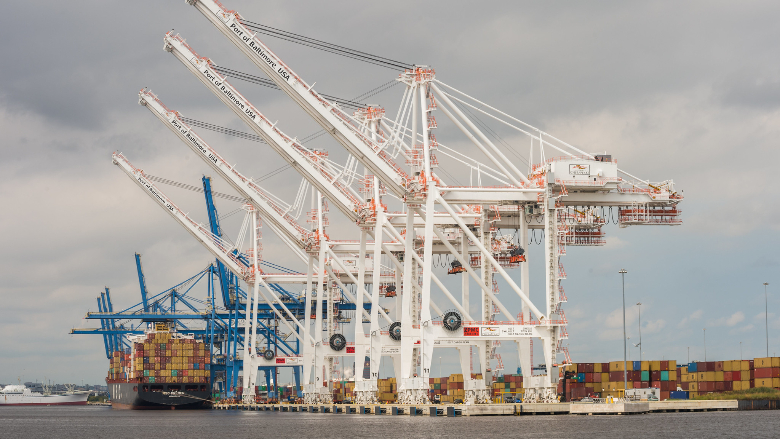How Will the Dockworkers Strike Impact Construction Supply Chains?


The strike halts work at East and Gulf coast ports, including the Port of Baltimore, pictured.
Photo by Bob Nichols/U.S. Dept. of Agriculture
Thousands of dockworkers at East and Gulf coast ports went on strike Oct. 1, a move with potential to have far-reaching supply chain impacts. But its effect on the construction industry remains to be seen.
The International Longshoremen’s Association (ILA) initiated its first coast-wide strike in nearly 50 years, saying the last offer from the U.S. Maritime Alliance (USMX), which represents the ports, before their last contract expired Sept. 30 “fell far short of what ILA rank-and-file members are demanding in wages and protections against automation.”
The strike halts work at ports of Boston; New York/New Jersey; Philadelphia; Baltimore; Norfolk, Va., Wilmington, N.C.; Savannah, Ga.; Tampa Bay, Fla.; Mobile, Ala., New Orleans and Houston.
“USMX brought on this strike when they decided to hold firm to foreign owned ocean carriers earning billion-dollar profits at United States ports, but not compensate the American ILA longshore workers who perform the labor that brings them their wealth,”ILA President Harold Daggett said in a statement.
The union said it is seeking a $5 per hour increase for each year of a six-year agreement, “airtight language that there will be no automation or semi-automation” and container royalty money for ILA.
USMX says it made an offer that would increase wages by nearly 50%, triple employer contributions to employee retirement plans and strengthen health care options. It also said the offer retains current language around limits on automation.
“The USMX increased our offer and has also requested an extension of the current master contract, now that both sides have moved off their previous positions,” USMX said in a statement. “We are hopeful that this could allow us to fully resume collective bargaining around the other outstanding issues–in an effort to reach an agreement.”
Construction Impacts
Carl Oliveri, construction practice leader and partner at accounting firm Grassi, wrote in a blog post that contractors should prepare for delayed arrival of imported materials and equipment and increased costs of some materials sourced domestically.
Some contractors have been preparing for the strike in advance. Mike Bruskin, vice president and chief procurement officer at Turner Construction Co., said in a statement that the company’s teams were already working with trade contractors and suppliers to mitigate any potential impacts.“Our projects will move forward as we implement contingency plans,” Bruskin said.
Gilbane Building Co. also warned of the potential strike last month, advising contractors to coordinate with subs and suppliers to expedite shipments, increase inventories of materials and spares, consider air freight as needed and explore other options for material sourcing.
Ken Simonson, chief economist for the Associated General Contractors of America, says he hasn’t yet heard about any impacts on construction inputs or equipment. But if the strike lasts, he expects it could impact obscure or specific components sourced from abroad.
“I remember the first supply chain impact on construction from Covid that I heard about was elevators and parts from Italy, which was hit very hard in February 2020, before anyone in the U.S. was dying,” he says via email.
However, the strike could affect construction more if supply chains are also impacted by other issues, such as ongoing impacts from Hurricane Helene and other possible storms, low water levels on the Mississippi River impacting barge movement and shipping disruptions related to Middle East conflict, Simonson adds.
Ending the Strike
The Associated Builders and Contractors joined the U.S. Chamber of Commerce and other groups calling on President Joe Biden to invoke the Taft-Hartley Act to halt the strike while negotiations continue. Under the law, Biden could impose an 80-day waiting period before workers could strike.
“If the Biden-Harris administration is serious about rebuilding America––and maximizing hundreds of billions of dollars in taxpayer investments in infrastructure, clean energy and manufacturing––the construction industry simply cannot afford any more supply chain disruptions and additional cost hikes on critical materials,” said Kristen Swearingen, ABC vice president of legislative & political affairs, in a statement.
However, Biden said two days before the start of the strike that he would not intervene.
Working Supply Chains
The strike does not impact West Coast ports. And ILA said its members would continue handling military cargo and working cruise vessels.
Mario Cordero, CEO of the Port of Long Beach in California, said in a statement that the port has been in close contact with ocean carriers, terminal operators, railroads and others to do what it can to keep the national supply chain operational.
“The port is handling just as much cargo as we did in 2021 and 2022 but without any of the pandemic-era backlogs, delays or congestion that arose due to issues outside the port,” he said.




